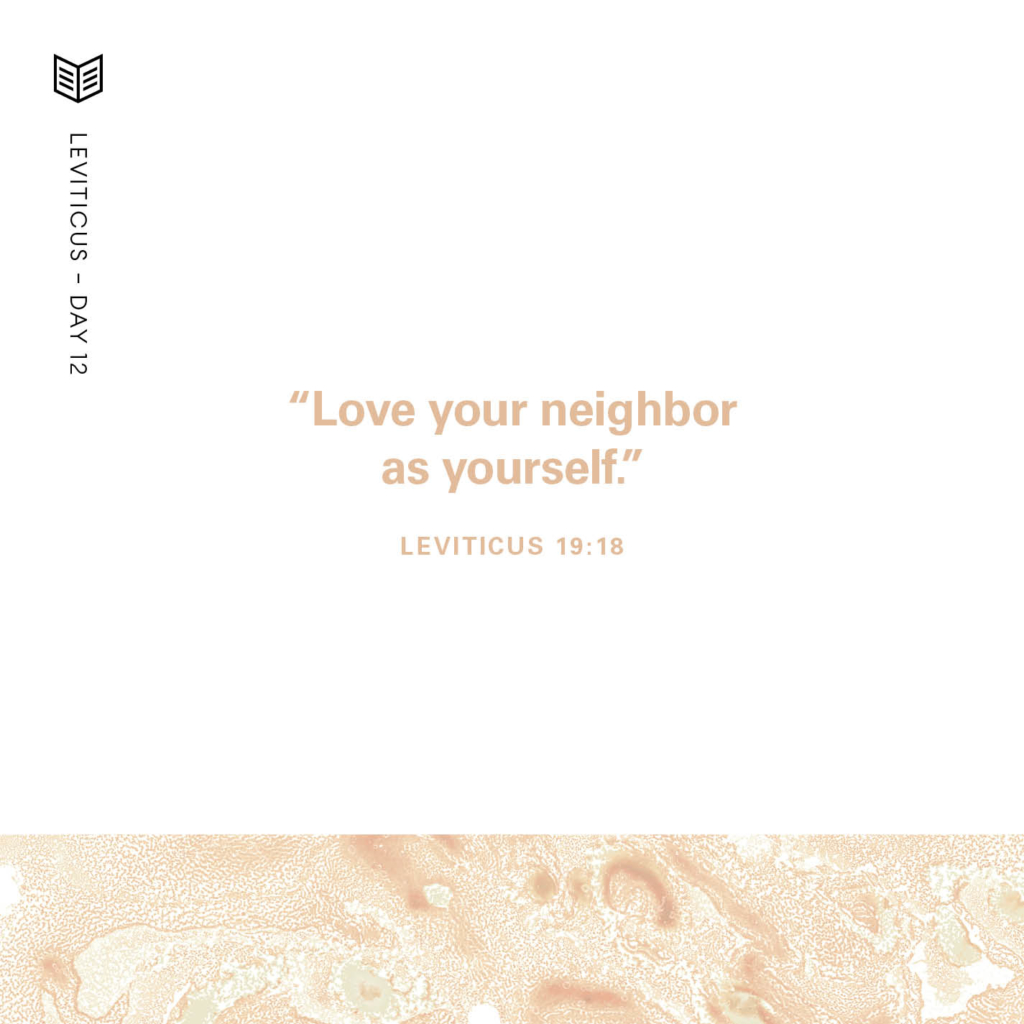Love for Neighbor
Open Your Bible
Leviticus 18:1-30, Leviticus 19:1-37, Psalm 133:1-2, Galatians 5:13-16
BY Bailey T. Hurley
This year my two oldest kids have become the best of friends and also the worst of enemies. The way they provoke one another exhausts a mother and necessitates the response: “you are a team, and you need to make this right because a team is at its best when it is operating together.” I wish I could tell you that my kids immediately respond in kindness. Instead, it often takes prompting and tears until they have resolved their conflict and decided they are buds again.
When it comes to making things right with our community, we too need external prompting—from the Holy Spirit. It isn’t as simple as it sounds to love your neighbor when we are prone to looking out for “me, myself and I.” In Leviticus 19, God offers a plan for a redemptive community that is unlike the world’s culture. In the world, people abuse and cheat to get ahead. They lie and steal to look better than their neighbor. They harbor revenge and let little issues spin into lifetime rifts. The world is fickle with its love and glorifies one’s success at the expense of another—if something or someone stands in your way, you have the right to take advantage of it.
The family of God can often feel not so different from the world’s relational drama. Paul warns the church of what will happen if they treat one another like the world treats one another: “But if you bite and devour one another, watch out, or you will be consumed by one another” (Galatians 5:15). The devil prowls around like a lion looking to cause division in the church, your communities, and your households. But God says, “How delightfully good when brothers live together in harmony!” (Psalm 133:1).
God doesn’t see people or communities as expendable commodities. He sees them as image-bearers (Genesis 1:26), beloved, cherished members of His family. So, God calls His people to fulfill the laws of holiness by “[loving] your neighbor as yourself” (Leviticus 19:18).
God’s community is different; it is set apart from the world to be an example of His holy communion. Because we are a team in the family of God, we can count the cost of relationships, as Christ counted the cost for us and lay down our lives for one another. In Christ’s loving-kindness, we can find the courage to fight for unity and wrestle with forgiveness even when it feels impossible.
When we find it impossible to work out our differences, I know Jesus makes it possible. Yes, there is work to be done when we would rather retaliate than restore relationships, but God is doing a good work in each of us. Moving us towards respectful care for one another—a holy unity.

38 thoughts on "Love for Neighbor"
-
Lord you are good and your mercy endureth forever
-
Behind on my reading but wanted to comment because I’m constantly being nudged with passages that discuss letting go of resentment. I have a really difficult relationship with my MIL and because of actions she took in the past and continues to do when visiting I get anxiety even before she comes. It causes issues with my husband because it’s still his mom, even though he can see how toxic her actions are at times. I have prayed for her, prayed to let go of my resentment, prayed for peace between us. I know in my heart though that I am still bitter and it’s so difficult to fully move on when she isn’t going to change. I know I’m called to be better though and want to desire to be.
-
I was really in awe of how much God loves us, that he gives us these boundaries to live within, that we can draw close to him, despite our own flesh.
-
My love to you all!
-
@Dorothy I was wondering the same, with Jacob, Leah, and Rachel. I’m wondering if these rules were set in place by God to avoid conflict, drama, and tension in the family, because Jacob’s household was full of it. At the same time, I think what Jacob did in taking Leah as his wife and caring for her (despite his love for Rachel) was a kindness, because he was tricked by his uncle Laban and given Leah first. He fulfilled his covenant to Laban by marrying her and staying with her. Jacob must have been so patient to work 7 years only to get tricked with marrying Leah, and then working another 7 years to marry Rachel. It’s hard to understand Biblical times for sure, and it’s definitely not a happy arrangement, but that’s my thoughts on why these particular rules came about.
I fell behind on my readings since I was at a business conference in Washington last week. I am almost caught up. It takes longer, but I love reading your comments because they add so much value to my life and understanding of what we’re reading! It’s neat to see how this book ties in with Jesus’ sacrifice and also many stories from the Bible (Ruth and Jacob come to mind). How tough it must have been to live in those times, especially as a woman. Even though present times are challenging as well, I’m thankful to God I’m here now, and not then!
Praying for all of the requests shared. <3
-
@Rhonda J. Glad to hear you guys are managing. Praying things get easier down there every day.


Post Comments (38)